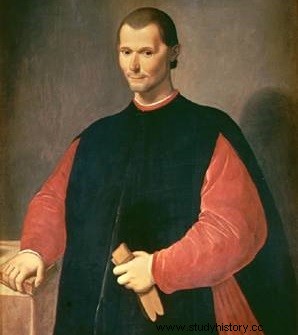 Nicholas Machiavelli (1469-1527) was an Italian Renaissance politician and writer, known for his political work titled The Prince . He is associated today with the pejorative adjective taken from his name, “Machiavellian”, and his work reduced to a manual of manipulation and political cynicism still used by our rulers. However, the famous Florentine is first and foremost a man of his time, that of the Italian wars and of Florence shaken by the Medici and their enemies. And his most famous work, The Prince , which quickly became a classic, a great source for understanding Renaissance Italy. A biography of Machiavelli must therefore be part of the political history of his time.
Nicholas Machiavelli (1469-1527) was an Italian Renaissance politician and writer, known for his political work titled The Prince . He is associated today with the pejorative adjective taken from his name, “Machiavellian”, and his work reduced to a manual of manipulation and political cynicism still used by our rulers. However, the famous Florentine is first and foremost a man of his time, that of the Italian wars and of Florence shaken by the Medici and their enemies. And his most famous work, The Prince , which quickly became a classic, a great source for understanding Renaissance Italy. A biography of Machiavelli must therefore be part of the political history of his time.
Birth and youth of Nicolas Machiavelli
Nicholas Machiavelli was born in Florence on May 3, 1469; his father, Bernardo, is a low-level notary. Little is known of Machiavelli's youth, or even of his inspirations, even if it seems that it was his mother who gave him his taste for poetry and his father for studies and books. This year 1469, in December, the son of Cosmo the Elder, Pierre de Médicis, dies in Florence. He was succeeded by his sons Laurent (future “the Magnificent”) and Julien. In the Papal States, it was the death of Paul II in 1471 that brought to power Sixtus IV (Francesco della Rovere), rival of the Borgia dynasty. The della Rovere family is openly hostile to the Medici and to the Florence of the young Machiavelli, who begins to study the "Donatello" in 1476.
The Italy of Machiavelli's youth is that of the Peace of Lodi (1454) which saw a semblance of a truce between the different Italian states:the context may therefore seem relatively peaceful. But pressure from powerful neighbours, France and Spain (themselves in full completion of their political unity), as well as the still buried rivalries between Italian cities, undermined this peaceful coexistence. In 1478, a first political event marked the young Machiavelli, in Florence itself:the conspiracy of the Pazzi, during which Giuliano de Medici was assassinated. She will inspire him for the Discourses on the first decade of Livy or especially for History of Florence . In the following years, the France of Louis XI and then Charles VIII, and the Spain of the Catholic kings completed their political unity, which would also be important in the future work of the Florentine.
Machiavelli and the Florence of Savonarola
The year 1492 was decisive not only in Spain, where the conquest of Granada ratified Spanish unity. April 8 dies Lorenzo the Magnificent whose power was very heavy (not to say tyrannical) in Florence. His successor Peter II was no match for the other Medici and two years later he was overthrown by Brother Savonarola, a Dominican monk. But 1492 also saw the arrival at the head of the Church of Alexander VI Borgia who very quickly named his very ambitious son Caesar cardinal.
In 1494 a danger this time from outside fell on Italy:in the fall, the King of France Charles VIII crossed the Alps to come and conquer the Kingdom of Naples. This is the beginning of what we will call the Italian wars . The French contribute to the fall of the Medici in Florence, and deliver Pisa from Florentine tutelage, which Machiavelli does not fail to retain. Just like the reasons for the rapid failure of Charles VIII the following year, who had to cede the Regno (Naples) to Aragonese guardianship. 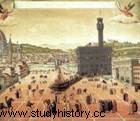
The Florence of Savonarola is finally another dictatorship, but this time religious. The monk falls out with Pope Alexander, and always demands more austerity and purity from the Florentines. In 1497 he was excommunicated by Alexander VI, and less than a year later he was arrested, executed and his body burned in a public square in Florence. We do not know the details, but it would seem that the fall of Savonarola marked the beginnings of the political activity of Machiavelli, the latter opposing the monk. In February 1498, he was appointed second secretary of the Lordship, then Savonarola executed he became secretary of the Second Chancellery and above all, a few weeks later, received the decisive post of secretary of the Ten attached to foreign affairs.
This is an opportunity for Machiavelli to travel the country and meet many princes, while the political situation is accelerating... Indeed, still in 1498, Charles VIII dies and succeeds him Louis XII; the latter is just as determined to get what he thinks is his due on the peninsula, namely Napoli and the Milanese. Seeking allies in Italy, Louis XII made the pope's son, César Borgia, Duke of Valentinois in August. In exchange, Alexander VI agrees to dissolve the marriage of the King of France with Joan, so that he can marry Anne of Brittany.
Nicolas Machiavelli at the court of Louis XII
Machiavelli began his diplomatic missions in 1499:he was first tasked with recruiting a condottiere, the Florentine Republic planning to reconquer Pisa; for this he meets the famous Catherine Sforza, from whom he continues to learn politics. However, the random support of Ludovico le More and the betrayal of the condottiere Paolo Vitelli (executed in 1499) led Florence to a series of bitter failures in Pisa until 1509, which indirectly fell on the reputation of Machiavelli, who had nevertheless left for other missions.
In the meantime, Louis XII began his war in Italy and conquered Milan for the first time, then a second in 1500, this time definitively defeating Ludovico le Moor (exiled in France, where he died in 1508). The foreign policy of the Lordship is still as uncertain in the face of the French and Valentinois danger, to the great displeasure of Machiavelli who nevertheless continues to serve it. He was thus sent to France in the second half of the year 1500, to the very court of Louis XII; he learns a lot there for his mission, but even more for his work (and in particular The Prince ), while supporting French arrogance. This is where he responds to the Archbishop of Rouen saying that the Italians know nothing about "things of war", that the French know nothing about "things of the State". /P>
In Italy, Caesar Borgia continued his conquests:at the end of 1499, he seized Imola and Forli (to the detriment of Catherine Sforza). In October 1500, the Valentinois seized Pesaro and Rimini with the help of French troops. In 1501, his appetite for conquest led him to Faenza and his father made him Duke of Romagna. While Louis XII forbade him to take Bologna, César Borgia attempted a rapprochement with Florence, who refused to take him as condottiere when he wanted to restore Pierre II de Médicis. While Borgia accompanies the French in the kingdom of Naples, the Lordship instructs Machiavelli to thwart the maneuvers of the Valentinois in Siena. That same year, Machiavelli married Marietta Corsini.
With Cesar Borgia
The year 1502 is an important new date for Italy and for the author of Prince . While the French and the Spaniards dispute Naples, César Borgia does not cease his conquests:he thus took Urbino. This obviously worried Florence, who also had to face the rebellion in Arezzo; the Signoria therefore sent Bishop Francesco Soderini, accompanied by Machiavelli, on June 22 to meet the Duke of Romagna in Urbino. Machiavelli stays only a few days, enough to guess the hostile intentions of the Valentinois; but the character inspires him just as much for his future Prince . In the following months, Florence manages to reduce the revolt of Arezzo thanks to French aid, and Machiavelli is in charge of recovering the rebellious cities.
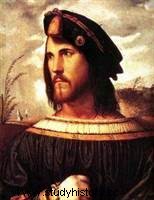 This does not prevent the Republic from reforming and creating the office of gonfalonier for life, endorsed by Pierre Soderini on September 22, 1502. As for Borgia, he began to experience some difficulties in his relations with France, and especially with his condottieres:he asked for help from Florence, who sent him an emissary… Machiavelli! The Florentine is in the front row to witness the consequences of the Diet of the Magione, which seals the alliance of the condottieres against Borgia and leads to the uprising of the Duchy of Urbino. The Valentinois had to ask for help from France, and at the end of the year he managed to get rid of the conspirators and recover his territories.
This does not prevent the Republic from reforming and creating the office of gonfalonier for life, endorsed by Pierre Soderini on September 22, 1502. As for Borgia, he began to experience some difficulties in his relations with France, and especially with his condottieres:he asked for help from Florence, who sent him an emissary… Machiavelli! The Florentine is in the front row to witness the consequences of the Diet of the Magione, which seals the alliance of the condottieres against Borgia and leads to the uprising of the Duchy of Urbino. The Valentinois had to ask for help from France, and at the end of the year he managed to get rid of the conspirators and recover his territories.
Machiavelli left the duke at the beginning of 1503, when he resumed his conquests (Perugia, Siena,…). He continued his diplomatic activities for Florence in an Italy still agitated by French and Spanish maneuvers and rivalries between cities. Machiavelli writes, then goes to Rome at the end of the year, where he meets Caesar Borgia for the last time.
The defense of Florence threatened
The end of 1503 marks a very important political change:Alexander VI, father of the Valentinois, dies and succeeds him Julius II, immediately very hostile towards the Duke. He forces him to give up several of his conquests to the Church. In addition, the Battle of Garigliano on December 28 led to the abandonment of Naples by the French, and the death of Pedro II de Medici. Machiavelli knows a little more happiness with the birth of his son.
The Florentine Republic is worried about the departure of the French, and sends Machiavelli to the kingdom of Louis XII in 1504. The political and military situation relaxes between France and Spain, and Machiavelli can go home as early as March. He writes, and sees his second son born. The lull is short-lived:Florence is threatened by the ambitions of the condottiere Bartolomeo d'Alviano, and she is looking for support.
During the year 1505, Machiavelli was tasked with finding help, but he suffered many refusals; he then decided to raise troops in Florentine territory itself. The following year, after having supervised the recruitment of the Florentine infantry, he was sent to Pope Julius II, whom he followed in his reconquest of Romagna at the expense of local princes and Venice (which took advantage of the problems of Borgia ), to Bologna. During this expedition he learned a lot from the confrontation between the pope and the condottiere Baglioni.
It is for Florence that Machiavelli worries at the end of 1506; the Republic is threatened internally by divisions between the patricians and the gonfalonier Soderini. Machiavelli writes the decree of the Creation of the Nine of the Ordinance and the Militia, and he is quickly seen as a man of the gonfalonier. For this, he is caught in a cabal that goes so far as to sully the memory of his family, when he is appointed Chancellor of the Nine of the Militia. These divisions deepened in 1507 when Soderini decided to send Machiavelli to the court of Emperor Maximilian (who pressured the Republic for money); the gonfalonier's rivals impose Francesco Vettori to replace the chancellor, but Machiavelli finally manages to join him a little later. A new opportunity for him to learn from other princes, and to write.
Back in 1508, Machiavelli resumed his recruiting campaign for the Florentine army, when the League of Cambrai was formed (France, Spain, Papal States, Emperor and Italian cities against Venice). The siege of Pisa is a failure, but Florence obtains from Louis XII and Ferdinand the right to conquer the city, which revives Florentine hopes! Machiavelli, this time with the backing of the great powers, returned to Pisa with his infantry on June 2, 1509; he then left for Mantua. At the same time, Venice loses to the League at the Battle of Agnala.
Machiavelli caught in the storm
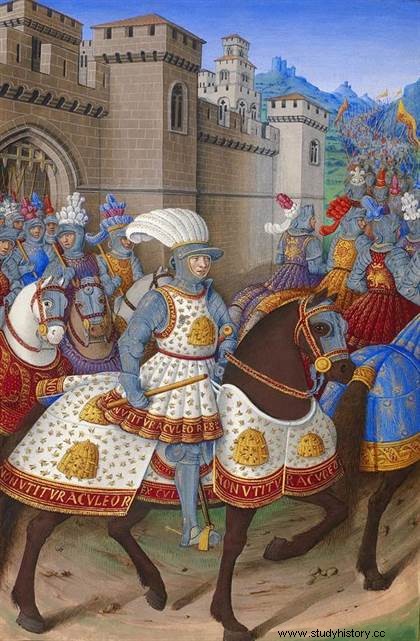 The following two years, Machiavelli continued to recruit (this time cavalry) but also to travel. He travels again to France, then to Monaco and to various cities in Italy. But the international context is still not serene, quite the contrary:after having made peace with Venice, Julius II openly opposes the King of France, considered too greedy. The city of Florence finds itself in the middle and as often procrastinates in its decisions and in its choice of alliance, but remains faithful to the French; Machiavelli is at the center of the discussions on the council that the clergy of France want to mount against the pope, and Florence proposes that it take place in Pisa.
The following two years, Machiavelli continued to recruit (this time cavalry) but also to travel. He travels again to France, then to Monaco and to various cities in Italy. But the international context is still not serene, quite the contrary:after having made peace with Venice, Julius II openly opposes the King of France, considered too greedy. The city of Florence finds itself in the middle and as often procrastinates in its decisions and in its choice of alliance, but remains faithful to the French; Machiavelli is at the center of the discussions on the council that the clergy of France want to mount against the pope, and Florence proposes that it take place in Pisa.
Julius II responds by convening a council in the Lateran, and threatens Florence with a ban! Machiavelli then tries to delay the Council of Pisa, but it is too late:the pope allies with the Spaniards in a Holy League directed against France (and implicitly against its Florentine ally), and the schismatic council is a failure. The hours are so dark at the end of 1511 that Machiavelli writes his will, despite the birth of his third son...
The following year hardly lends itself to optimism:the French are expelled from the peninsula despite the victory at Ravenna. Machiavelli, who was preparing the defense of Pisa, is recalled to threatened Florence. It is again too late:the Spaniards loot the Prato on August 28, and three days later Soderini agrees to leave the city. This is the sequence:despite the election of a new gonfalonier, the Medici reinvest the city with at their head Cardinal Jean, papal legate (and future Leo X), and Julien de Médicis. Machiavelli's militia is dissolved and the Chancellor broken and expelled from all his charges.
Machiavelli begins the year 1513 in jails where he is probably tortured. However, he was released two days after the election of Jean de Medici as pope (in place of Julius II, who died on February 21). Exile begins. Machiavelli leaves for his family residence in the Tuscan countryside, where he begins a correspondence with Vettori, ambassador to the pope. It was also during this period that he began the Discourse on the first decade of Livy , which he suddenly interrupts to write The Prince . He talks about it to Vettori and thinks of presenting his work to Giuliano de Medici, to be reinstated in the Florentine administration. The exile lasted another good year, during which Machiavelli consoled himself with the birth of his fourth son, while remaining in contact with Vettori and indirectly with the Medici.
Hope for a comeback
The year 1515, as we know, is decisive for Italy. Machiavelli seems to approach political action when Giuliano de' Medici asks the pope to consult him on the organization of the militia; but the sovereign pontiff refuses. Meanwhile, François I has succeeded Louis XII and enters Italy:he defeats the Swiss at Marignan and gets his hands on Milan.
In 1516, a chain of events suggests that Machiavelli may return to politics:at the international level, Charles V succeeds Ferdinand of Aragon, but above all Giuliano de Medici dies and comes to power Laurent his nephew. While he seizes Urbino, Machiavelli decides to dedicate The Prince to him . He is authorized to return to Florence, but without obtaining a charge; he continues to write and make known his works which he reads in public and dedications. In 1518, he was able to travel again thanks to a mission entrusted by Florentine merchants; he thus goes to Genoa. 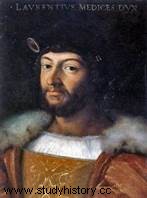
The failure of Nicolas Machiavelli
It was not until 1525 and the battle of Pavia that the French were again excluded from Italy, Francis I even being a prisoner of Charles V. The latter, already, opposes Pope Clement VII. Machiavelli goes to Rome the same year and meets the Medici to offer him his History of Florence as promised.; the pope confides in him his concerns about the threat of the Empire, and suggests that he set up an army. He then sends him to Romagna to Guichardin to obtain his support, in vain. Machiavelli returns to Florence, then carries out one last mission for the merchants, this time in Venice.
The Florentine, however, has not decided to give up in the face of the imperial threat; as early as 1526, he contacted Guichardin to ask him to convince the pope to hire the young captain Jean-des-Bandes-Noires, but Clement VII refused. On the other hand, the pope agrees to name Machiavelli chancellor of a commission of fortifications for Florence. On May 17, the Florentine city joined Francis I, Venice and the sovereign pontiff in the alliance sealed in the Treaty of Cognac. The months of June and July, Machiavelli is with Guichardin and his armies in Lombardy. However, Clement VII's maneuvers failed and Charles V had every intention of making him pay:he hired the Constable of Bourbon who plundered the Roman Republic on May 6, 1527.
Machiavelli tried in vain with Guichardin to prevent the tragedy, but their armies were unable to compete with those of the Empire, which avoided Florence anyway. The latter is nevertheless punished in turn, and the Medici driven from power. Machiavelli returns to his city, perhaps hoping to obtain a few functions in the chaos which strikes it; but his reputation is long since tarnished, and he bears some responsibility for the failed defense of the city. He died exhausted on June 21, 1527. His most famous work, The Prince , was published for the first time in Rome, with papal privilege, in 1532. It enjoyed immediate success, and quickly beyond the borders of Italy. It is still today a reference of modern political science and a source of inspiration for many politicians.
Bibliography
- The Prince, by Niccolo Machiavelli. The Beautiful Letters, 2019.
- Life of Machiavelli, by Roberto Ridolfi. The Beautiful Letters, 2019.
- P. Boucheron, Léonard et Machiavelli, Verdier editions, 2008.
- The Work of Machiavelli, by Claude Lefort. Pocket, l1986.
